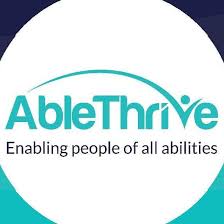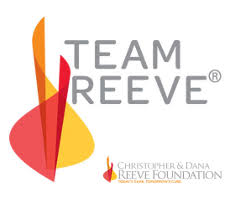|
Thank you for following my blog! Coming in June of 2019: my brand-new, once-a-month Serendipity newsletter with happy news, great photos, and helpful resources! At the same time, my blog will change to three times a month (instead of four) with the addition of some tweaks and surprises! Stay tuned! *Cindy
- - - - - - Graduation encompassed a whole week of senior festivities, including a fancy champagne breakfast on tables covered with white linen. At a luncheon to recognize seniors in the health policy program, I watched Beth wheel forward to speak to the group. My quiet and shy daughter had bloomed into a confident and articulate young woman. We celebrated at Bertucci’s after Beth received her second Peter Wilson award. This one earned her $7,500 for graduate school. My parents drove from Ohio to join us for the pageantry of the Harvard commencement. Professors in colorful robes with banners led the parade into Harvard Yard. The Class of 2008 followed. Students from Harvard’s 10 graduate schools identified their specialties with creative additions to their graduation robes and hats. We witnessed the perfect ending to Beth’s years as a Harvard student. J.K. Rowling, author of the Harry Potter series, spoke at the 357th Commencement. During her speech, John received a phone call offering him a teaching job in Waltham. I listened to Rowling’s rags to riches speech and remembered the evenings in rehab when Beth and I read Harry Potter books aloud to each other. It was a lovely reprieve from overwhelming days. If only I’d known then where she would graduate from college—and what would follow!
4 Comments
The day after the concert, John drove Beth and me to the airport for a last-minute weekend trip to Florida. Dr. Hugo Keim, President of ChairScholars, asked Beth to speak to a large crowd of kids with disabilities and their families at their annual festival near Tampa. Dr. Keim and his wife Alicia shared with us how ChairScholars began with a single gift in 1992. It expanded to include scholarships for young people with disabilities in Florida and across the country.
The festival would be the perfect opportunity to thank them in person for Beth’s most generous college scholarship. Under an immense white tent at the April festival, I talked to remarkable parents and thought of John. More social than me, he often said that everyone has a story. Beth wheeled up the ramp to face the crowd and talked about being open to opportunities and going for the gold, in sports and in life. She encouraged the kids to appreciate the perks of using a wheelchair, like how push handles are great for carrying bags. And favorite shoes that last forever. After her speech, some asked for an autograph. It turned into a teaching moment when another mom noticed her unusual grip on the pen. Others crowded around as Beth showed the mom’s daughter how she held and wrote with a standard pen. Beth’s overseas travels during her years at Harvard concluded with her third trip to England’s World Cup in May and another 50 back bronze medal—in the absence of the three brand new S3 swimmers. Would they skip the Beijing Paralympics? Not likely. Back at Harvard, Beth planned her last Friday activity for kids with disabilities and said goodbye to the students and the new KSNAP director she’d trained. With no minutes to spare, swimming six days a week, she worried about finishing papers and studying for finals. Then, before long, glorious freedom. Next: A Harvard Graduation! My brand-new Serendipity Newsletter is coming soon! Signed copies of my new book, Struggling with Serendipity, are available at bit.ly/mymemoiroffer. ❤ Afternoon power naps kept Beth going into the night, though she still looked exhausted. As her senior thesis deadline approached, long to-do lists on her laptop overwhelmed, but she met deadlines. Barely.
Working at a frantic pace, Beth stayed up too late while I learned how to relax for the first time. I meditated most days, trying different methods and a variety of prompts. Visualizing the headache as an evaporating dark cloud didn’t help. The traditional body scan became my go-to meditation, even though the 30 minutes highlighted the specific ache in each body part. The rest of the day, the aches usually combined into a general malaise. Never bored, I left the TV off during the day and always had plenty to do. I often played music in the background, from musicals to classic rock. When I finished routine tasks, I tinkered at writing or picked up my sewing bag. I walked down and up Bear Hill and focused on eating better. I appreciated the year off from paid work. Beth officially presented her senior thesis, titled Framing Disability: A content analysis on media agenda-setting of disability issues in a political context. Her work earned high honors and analyzed how often specific disability issues appeared in newspaper articles in a presidential election year. Next: Which Law School? At Beth’s last Harvard Women’s Swimming and Diving banquet, the team donned gorgeous fresh-flower leis, gifts from a senior from Hawaii. Receiving the Coaches Award for attitude and contributions to the team surprised Beth. She presented her gold medal to Coach Morawski in gratitude.
The head coach framed the gold with a written tribute. The medal found a new home in the hallway leading to Blodgett pool among pictures of Harvard’s best. Beth would have more to add to her legacy. When the college swim season ended, Beth immediately plunged into a new training cycle. She worked with her Harvard coaches to prepare for the Paralympic Trials in April. Other Harvard teammates trained for the USA Olympic Trials or the Olympic Trials in their home countries. “The most amazing thing about Beth is though we classify her as someone who's disabled,” Coach Becca told a reporter, “she's just someone who shows the people around her how able she is.” At the end of February, Beth woke up one morning with a high fever and congestion. A chest x-ray showed a small pocket of pneumonia in the lower right lobe, not as severe as her first pneumonia. She insisted on trying antibiotics first before considering a hospital stay. I couldn’t convince her to minimize her swim training for more than a few days. She gradually felt better despite a relentless senior year and pool schedule. Next: Minneapolis Trials meet for the Beijing Paralympics! For Beth's third season on the Harvard Women’s Swimming and Diving roster, she added new pump-up songs to her swim meet iPod mix, including “Stronger” by Kanye West. I smiled when she sang along to the chorus. Maybe challenges really did make us stronger? During team practices, she usually typically swam a mile over two hours. In October, a doctor tried to drain her inflamed right elbow. He found no fluid, just swollen tissue.
Coach Becca worked with Beth during one-on-one sessions at Blodgett as well as team practices. “I never heard her complain,” the coach said in The Harvard Crimson. John and I looked forward to all of the HWSD home meets her senior year, often sitting sat with Maria in the red seats. At a November meet, with Harvard dominating the point count, three of Beth’s teammates wore flippers in a relay with my daughter substituted as the fourth. Other swimmers clustered at the end of the lane to cheer her on. She cut a whopping 10 seconds off her previous short course American Record in the 50 back, set at a HWSD meet only a year before. An article in the NCAA Champion magazine described how Beth, “added another level of excitement to home crowds at Blodgett Pool, especially when records were at stake.” “No matter what team we raced against,” Beth told a reporter, “people always came up to me and congratulated me. It was kind of strange sometimes, but I guess it's great for them to see someone with a disability compete on a college varsity team.” At the last home meet, swimmers on the men’s team honored Beth and the other seven seniors on her team with bouquets of flowers. Afterward, John, Maria, Beth, and I ordered pad Thai and big bowls of vegetable noodle soup at a Vietnamese restaurant in Harvard Square. The following weekend, I drove Beth to Yale in Connecticut to compete at the last away meet of the season. She laughed and clapped when the freshman swimmers on her team danced on the pool deck and sang, “We're All in This Together,” from High School Musical. Beth finished her Harvard career with six Paralympic American Records set at Blodgett pool in the free, back, and butterfly. *More exciting book news! Book talks and signings soon in Washington DC, Ohio, and Boston bookstores! bit.ly/mybooktour Hope to see you! My new memoir, Struggling with Serendipity, is available everywhere books are sold. Signed copies are available here: bit.ly/memoiroffer. Beth’s senior year at Harvard created a mosaic of color squares on her computer’s calendar. Orange for classes, red for assignment deadlines, yellow for disability work, blue for swim workouts, purple for fun, and green for everything else, including volunteering and swim meets.
Beth made a concerted effort to increase the purple blocks on her calendar. She participated in more college activities, most for the first time, including the annual ‘80s Dance, ‘90s Dance, A Cappella Concert, and Comedy Show. She also cheered for her friend Brittany during a rugby game. “Brittany got me out of my shell during my senior year,” Beth said. “Before then, I hardly ever went out socially.” Early one weekend morning after the T stopped running, Beth, Brittany, and three friends hailed a taxi in Boston. The driver said only four of them could ride at one time. Brittany creatively insisted Beth needed to sit on someone’s lap because of her disability. The driver kept his thoughts to himself as all five girls rode in the taxi to Harvard. With a full load of classes, Beth prioritized her homework, kept up on writing assignments, and saved books to read later. She no longer tried to read every word. Graduate school applications also required chunks of time. She applied to four law schools and a doctorate program at Harvard’s School of Public Health. ❤ Fun fact: Years later, Beth was a bridesmaid in Brittany’s wedding. This May (2019), Brittany will be a bridesmaid in Beth’s wedding! Exciting book news: my Washington DC, Ohio, and Boston events are set! bit.ly/mybooktour Signed copies are available at bit.ly/memoiroffer. Amazon has the paperback and kindle e-book for pre-order, with both coming very soon! ThAnK YoU FOR FOLLOWING MY BLOG! SOME OF YOU HAVE ASKED HOW TO GET A SIGNED BOOK: YOU ARE THE FIRST TO KNOW ABOUT EARLY ACCESS TO SIGNED COPIES OF MY NEW MEMOIR, STRUGGLING WITH SERENDIPITY! I am so grateful for your support and encouragement since I started sharing our story in this blog three years ago! One fall morning, Beth wheeled across the pool deck at Blodgett, and the Harvard men’s coach led his team in applause for her Rio medals. She swam six days a week in and out of the HWSD season during her senior year.
Coaches planned her training cycles to build up to her most important swim meet to date, the Paralympic Trials in April. Occasionally, I met Beth in the Blodgett lobby, helped her over the alarmingly-inaccessible bridge to Harvard Square, and bought us brunch, our favorite meal of the day. I encouraged her to use the bus after practice more often, but she didn’t. Maria taught five preschoolers with multiple disabilities in the Cambridge Public Schools. She started the classroom with two full-time teacher’s aides, including one with a master’s degree. In the Boston area, many adults with college degrees settled for underemployment to obtain health insurance. One of Maria’s students with complex medical needs moved away from Cambridge, a sanctuary city, to Boston with her mom, an illegal immigrant. I worried with Maria about their deportation to a country with subpar children’s services. I volunteered in her classroom a few times and helped with field trips. Maria's enthusiasm and compassion created a safe space for the children, who progressed at a surprising pace. Maria created and followed an intense schedule in 15-minute increments to allow her and her teacher aides to maximize instructional time. She had high expectations and energy. I remember thinking that the residents at my old jobs would benefit from Maria’s level of passion. Sadly, staff tended to have low expectations at too many institutions and group homes. I watched Maria work enthusiastically with a boy speaking his first words. Later, she sat quietly on the floor, blocking the only exit out of a padded play space where a little girl threw a major tantrum. The child tried to get Maria’s attention in negative ways. My daughter ignored the screaming. I thought, “She’ll be a great mom someday.” During a musical performance for parents, all the children, nonverbal and otherwise, played a role. I sat on the stage next to a girl’s tiny wheelchair and held a toggle switch for her to push. The switch played a recorded phrase. The boy learning to speak wore a butterfly costume. He flapped his wings and bounced to the microphone at regular intervals to cheerfully yell, “Chomp!” It was a word he couldn’t say a few months before. The audience loved it. I did, too. Next: Another spike! Beth's right elbow swelled and hurt for the first time. Initially, her doctor and the team’s athletic trainers recommended compression wraps and anti-inflammatory meds.
She never stopped swimming, feeling healthy and stronger than ever, except for the elbow. The college competition season approached. One of Beth’s friends on the U.S. Paralympics National Team also swam on the Yale team and successfully fought to compete at all meets, home and away. In contrast, Beth appreciated the time she gained by not traveling with the team. “The trips sounded exciting but staying back gave me more time for school work and volunteer activities,” Beth said. She sent swim workouts to the U.S. Paralympic National Team manager and reported her whereabouts to the United States Anti-Doping Agency for random drug-testing. Little to no social activities. Yet. Often the last to leave the varsity locker room after a practice, with her hair wet, she wheeled up the hill at the entrance to the sidewalk on North Harvard Street. She wheeled toward the Square to her classes. On frigid days, the hair below her hat freeze-dried. The curb cuts on the bridge over the Charles River had steep inclines, impossible in any kind of wheelchair. Unwilling to ask for help from one of the endless pedestrians, Beth wheeled in the street alongside the curb instead, sharing a lane with nonstop cars while drivers turned aggressively in front or behind her. Across the river, Beth often stopped at Dunkin’ Donuts for a soy latte and a whole grain bagel with blueberry cream cheese. Peet’s Coffee also was a favorite a little farther down the street. One morning at the Kennedy School of Government, she rode the elevator with Madeleine Albright, the first woman Secretary of State. Beth’s largest class, Justice, attracted hundreds of students to Sanders, my favorite theatre. Dr. Michael Sandel led lively discussions on all aspects of justice that kept students engaged—and the public as well. Harvard aired Justice online, for free. Next: Sisters in Cambridge! My oldest daughter Maria stuck to her plan to relocate to Boston when she graduated from Heidelberg. She hustled with a heavy class load to finish a double major in three and a half years. Before long, two of our three children would be in Massachusetts.
John agreed with me that we could live there, too. He knew how much I wanted to be with our kids. He started his thirtieth year of teaching in Tiffin, his last before retiring in Ohio. We planned to sell our house in the spring and move that summer. John decided he’d teach for a few more years in the Boston area because of the much higher cost of living there. At Harvard, Beth swam six times a week her junior year, and rode the bus at 6 a.m. with her teammates who lived in the Quad. She often arrived at Blodgett in sweatpants, with a swimsuit underneath that she’d pulled on before getting out of bed. The team stretched together on deck before getting in the water. Skipping practice? Not an option. When the rest of the team swam doubles, a second practice on the same day, Beth stayed with one. Coaches added a snorkel to the modified swim paddles and floats in Beth’s equipment bag. The snorkel eliminated the breathing challenges of her forward strokes. During hour and a half workouts, she typically swam about a hundred laps of 25 yards each. During peak times in her training cycles, workouts hit two hours and 3,000 yards, almost two miles. “My undergrad was devoted to swimming and health policy,” Beth wrote. “It was a struggle sometimes to be independent and keep up with the work, but I grew a lot during that time. I learned how to make new friends, to manage my disability, and to advocate for myself—not to mention becoming a much stronger swimmer. I like to joke that I spend more time in the pool than I do in class. I love this pool!” The locker room had a new plastic shower chair Beth finally requested. From a sitting position in her wheelchair, taking off a wet swimsuit in the varsity locker room required patience. I suggested suits one size bigger, but she liked them tight. Resolve and repetition gradually made dressing in her wheelchair easier, from button down sweaters to the zipper on her skinny jeans. Next: My New Job! Back at Harvard for the start of Beth’s junior year, I carried her chair and other items up from the basement storage room. I set up her dorm room before I drove back to Tiffin. She changed her concentration from biology to health care policy with the goal of attending law school. Beth told a reporter about her DC summer and why she changed her major.
“I really fell in love with the policy side of things. After the internship, there was an opening in Senator Kerry’s Boston office to work specifically on disability issues with one of his staffers. They invited me to do that. So, throughout my entire school year I worked in his Boston office. It’s completely different, because it’s much more focused on his constituents. But I really loved that, because you get to talk to people on an individual basis.” Beth rode the T by herself from Harvard Square to the Senator’s office near the Massachusetts State House. One day a week, sometimes two. She stayed on the subway and passed the T stop closest to the Senator’s office to avoid a steep hill. She planned for extra time to wheel the additional distance back to the office, avoiding the inaccessible T stops. She signed up for text alerts to get advance notice when elevators broke down. “When I answered phone calls, I recognized a desperation in their voices as they reached out to their Senator, who was all too often their last hope in solving their issues,” Beth said. “It was rewarding to resolve specific disability-related complaints, but some we could not help.” She stayed in touch with Mary in the DC office and joined the Senator and staff for events, including a campaign rally at Boston’s Faneuil Hall for Deval Patrick, soon-to-be Governor of Massachusetts. Coffee, Beth’s new habit, stoked long days of classes and homework, swim practice and meets, plus volunteering for KSNAP and Senator Kerry. Beth’s new major allowed her to create and follow an individualized program. She selected classes relating to health care, a wide field of study including economics, regulations, inequalities, public opinion, politics, quality control, and buzzwords like adverse selection and moral hazard. She looked forward to classes at two graduate schools. “I explored health care policy and disability issues with courses at Harvard’s Kennedy School and Law School.” They were her favorite classes. Next: A Big Decision! |
Cindy KolbeSign up for my Just Keep Swimming Newsletter by typing your email address in the box. Thanks!Categories
All
Archives
November 2022
|
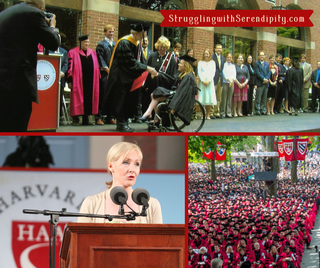


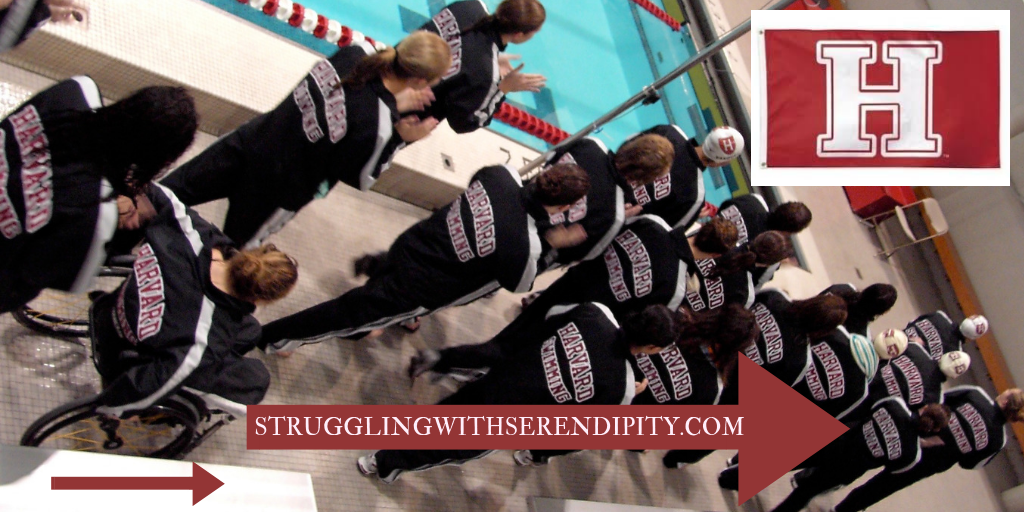
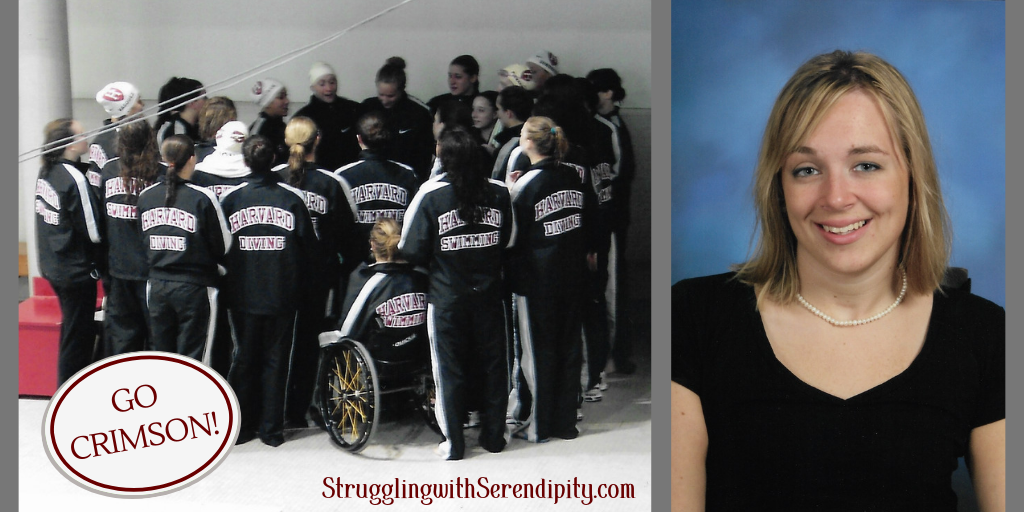






 RSS Feed
RSS Feed





